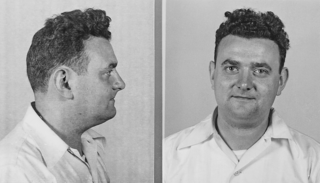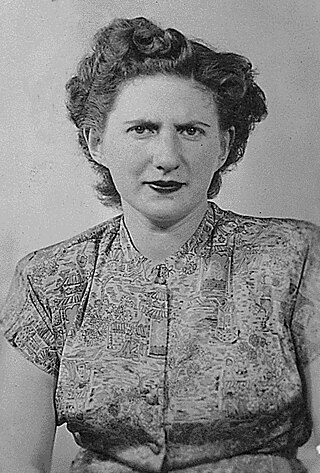Related Research Articles

Julius Rosenberg and Ethel Rosenberg were a married couple who were convicted of spying for the Soviet Union, including providing top-secret information about American radar, sonar, jet propulsion engines, and nuclear weapon designs. Convicted of espionage in 1951, they were executed by the federal government of the United States in 1953 at Sing Sing Correctional Facility in Ossining, New York, becoming the first American civilians to be executed for such charges and the first to be executed during peacetime. Other convicted co-conspirators were sentenced to prison, including Ethel's brother, David Greenglass, Harry Gold, and Morton Sobell. Klaus Fuchs, a German scientist working in Los Alamos, was convicted in the United Kingdom.

The Jewish Council for Public Affairs (JCPA) is an American Jewish nonprofit organization that advocates for progressive and liberal policies. Founded in 1944 as the umbrella organization for local Jewish advocacy arms known as community relations councils, for almost 80 years it represented approximately 125 local Jewish federations and community relations councils and was the coordinating body for 15 national Jewish organizations.
Abel Meeropol was an American songwriter and poet whose works were published under his pseudonym Lewis Allan. He wrote the poem "Strange Fruit" (1937), which was recorded by Billie Holiday.
A war cabinet is a committee formed by a government in a time of war to efficiently and effectively conduct that war. It is usually a subset of the full executive cabinet of ministers, although it is quite common for a war cabinet to have senior military officers and opposition politicians as members.
The American Jewish Committee (AJC) is a Jewish advocacy group established on November 11, 1906. It is one of the oldest Jewish advocacy organizations and, according to The New York Times, is "widely regarded as the dean of American Jewish organizations". As of 2009, AJC envisions itself as the "Global Center for Jewish and Israel Advocacy".

David Greenglass was an American machinist and atomic spy for the Soviet Union who worked on the Manhattan Project. He was briefly stationed at the Clinton Engineer Works uranium enrichment facility at Oak Ridge, Tennessee, and then worked at the Los Alamos Laboratory in New Mexico from August 1944 until February 1946.

Michael Meeropol is an American retired professor of economics. He is the older son of Julius and Ethel Rosenberg, convicted communist spies. Born in New York City, as Michael Rosenberg, Meeropol spent his early childhood living in New York and attending local school there.

Ruth Leah Greenglass was an American citizen who acted as a spy for the Soviet Union along with her husband, David Greenglass.

Morton Sobell was an American engineer and Soviet spy during and after World War II; he was charged as part of a conspiracy which included Julius Rosenberg and his wife. Sobell worked on military and government contracts with General Electric and Reeves Instrument Corporation in the 1940s, including during World War II. Sobell was tried and convicted of espionage in 1951 and sentenced to 30 years in prison.

Robert Meeropol is the younger son of Julius and Ethel Rosenberg. Meeropol was born in New York City. His father Julius was an electrical engineer and a member of the Communist Party USA. His mother Ethel, a union organizer, was also active in the Communist Party USA.

Atomic spies or atom spies were people in the United States, the United Kingdom, and Canada who are known to have illicitly given information about nuclear weapons production or design to the Soviet Union during World War II and the early Cold War. Exactly what was given, and whether everyone on the list gave it, are still matters of some scholarly dispute. In some cases, some of the arrested suspects or government witnesses had given strong testimonies or confessions which they recanted later or said were fabricated. Their work constitutes the most publicly well-known and well-documented case of nuclear espionage in the history of nuclear weapons. At the same time, numerous nuclear scientists wanted to share the information with the world scientific community, but this proposal was firmly quashed by the United States government. It is worth noting that many scientists who worked on the Manhattan Project were deeply conflicted about the ethical implications of their work, and some were actively opposed to the use of nuclear weapons.
Arthur Kinoy, was an American attorney and progressive civil rights leader who helped defend Ethel and Julius Rosenberg. He served as a professor of law at the Rutgers School of Law–Newark from 1964 to 1999. He was one of the founders in 1966 of the Center for Constitutional Rights in New York City, and successfully argued a number of cases before the Supreme Court of the United States. He also founded the Public Interest Law Center of New Jersey.
Emanuel Hirsch Bloch was an American attorney known for defending clients associated with left-wing and Communist causes. He and Marshall Perlin defended Julius and Ethel Rosenberg.

Helen Levitov Sobell was an American teacher, scientist and activist, and the former wife of convicted spy Morton Sobell. She petitioned but failed to save Julius and Ethel Rosenberg from execution for conspiracy to commit espionage.

Anne Sebba is a British biographer, lecturer and journalist. She is the author of nine non-fiction books for adults, two biographies for children, and several introductions to reprinted classics.

Capital punishment was outlawed in New York after the New York Court of Appeals, the highest court in the state, declared the practice as currently practiced unconstitutional under the state's constitution in 2004. However certain crimes occurring in the state that fall under the jurisdiction of the federal government are subject to the federal death penalty.
William A. Reuben was an American journalist and writer who focused on the Rosenberg and Hiss cases.

Miriam Ruth Moskowitz was an American schoolteacher who served two years in prison after being convicted for conspiracy as an atomic spy for the Soviet Union.
National Committee to Secure Justice in the Rosenberg Case, also known as the Rosenberg Committee, was an organization formed by the National Guardian to defend Julius and Ethel Rosenberg and secure clemency for them.
References
- ↑ "Julius and Ethel Rosenberg trial ephemera". Bryn Mawr College . Retrieved April 9, 2023.
- ↑ "Inventory of the National Rosenberg Defence Committee records". Online Archive of California . Retrieved April 9, 2023.
- ↑ "Letter from W. E. B. Du Bois to National Rosenberg Defence Committee, June 12, 1954". UMassAmherst . Retrieved April 9, 2023.
- ↑ "Execution of the Rosenbergs – archive, 1953". The Guardian . Retrieved April 9, 2023.